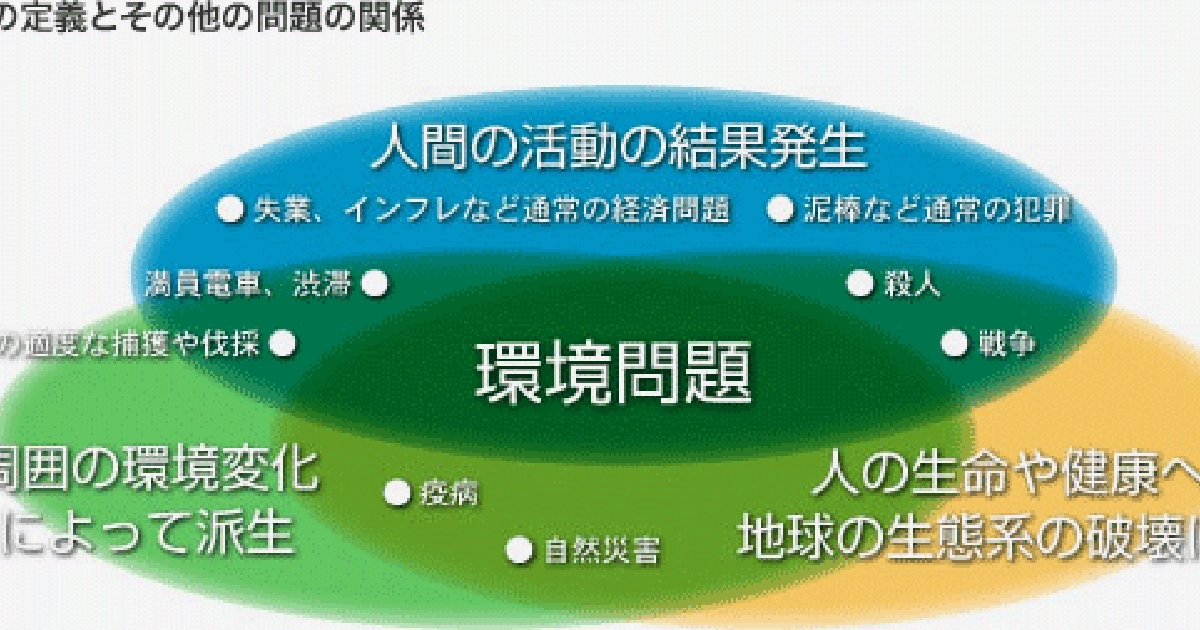代表のEcoコラム
10. 急激な温暖化
2008.12.15
これまでのコラムで、より長期的な視点に立って、世界的に取り組まなくてはならない問題 として、最重要な課題として3つ をあげ、これまでその問題の中の「エネルギー資源、水、食糧の不足」、「放射性物質の利用と廃棄」 についての情報をまとめてきました。
今回、3つの問題のうちの最後にとりあげるのが「急激な温暖化」 ということになります。温暖化については、現在、日進月歩でいろいろな研究が世界中でなされているところで、まだその温暖化に対する科学的に確立された理論や分析があるわけではありません。
現在は、とりあえずは、世界的にもっとも認められた温暖化に対する見解として、2007年に出されたIPCCの第4次評価報告書の第一作業部会報告書(以下IPCC報告書)というものを信頼して考えをすすめていくしかないかと思います。以下の図やグラフなどはすべて、そのIPCC報告書からのもの です。原文は以下のリンクを参照してください。https://www.env.go.jp/earth/ipcc/4th/syr_spm.pdf
以下にIPCCの報告書の中から特にCO2と温暖化に関わる部分を整理して表記し、最後に自分の意見をまとめておきます。
●地球は本当に温暖化しているのか?
150年のスケールで見た場合
気温の計測方法:温度計による気温測定
- 2005年まで100年間で 0.74℃の上昇
- 上昇のスピードは早まっている。
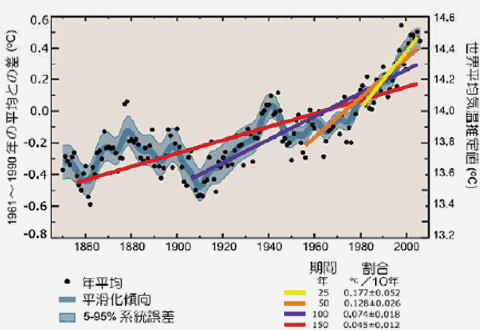
1300年のスケールで見た場合
気温の推定方法 :樹木の年輪や氷床、貝殻や有孔虫など自然界にあるさまざまな材料を使って推定
- 現在が、過去1300年間で最も暖かい時代である。
- 20世紀以降に急な温度上昇が見られる。
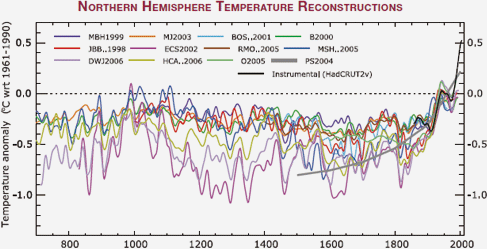
65万年のスケールで見た場合
気温の推定方法 :南極やグリーンランドの氷床コアの分析から推定
- 過去50万年間に温暖な間氷期と寒冷な氷期が5回ほど繰り返されており、現在は間氷期である。
- 以前の間氷期では、現在の気温よりも高い時期もあった。
(まとめ)
- この100年間で地球が温暖化したことは疑う余地がない 。
- しかも、その気温上昇のスピードはどんどん早まっている。
- しかし、現在の気温の高さ自体は、自然の現象としても起こりうる範囲のものである。
- 問題は、気温の高さではなく、温暖化のスピードが大きすぎることである。
65万年のスケールで見た場合
- 去65万年は180~300ppmだった。
産業革命の直前は、280ppm程度であった。
その後、急激に上昇して、2005年には379ppmに増加した。 - しかも、CO2濃度の増加スピードはどんどん高くなっている。
1995年~2005年の10年間のCO2濃度の増加スピードは、1960年からの観測以来最も高くなっている。 - 大気中のCO2の濃度の増加の主要因は、人為的な活動によるものである。
1750年以来、人為起源の二酸化炭素排出の約3分の2は化石燃料の燃焼から生じ、約3分の1 は土地利用の変化(森林破壊やバイオマスの腐敗など)から生じたものと推定されている。
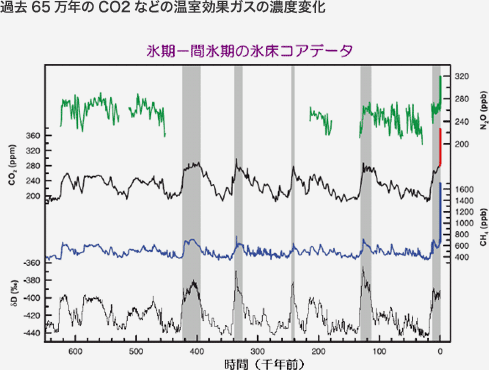
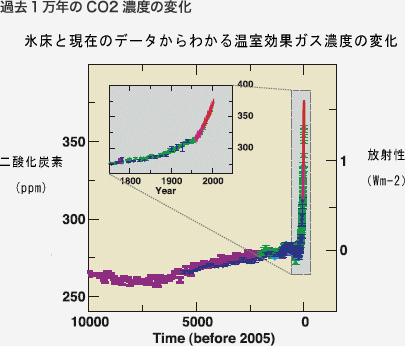
●CO2などの温室効果ガス濃度の増加が温暖化の主要因か?
- 20世紀半ば以降に観測された世界平均気温の上昇のほとんどは、人為起源の温室効果ガスの増加によってもたらされた可能性がかなり高い。
- その根拠としては、下記のシミュレーション結果が挙げられる。
シミュレーションの条件として、人為的な温室効果ガスの増加などの影響を考慮すれば、実際の気温変化のデータとよく一致するが、それらを考慮しない場合は、実際のデータと一致しない。
(下図を参照)
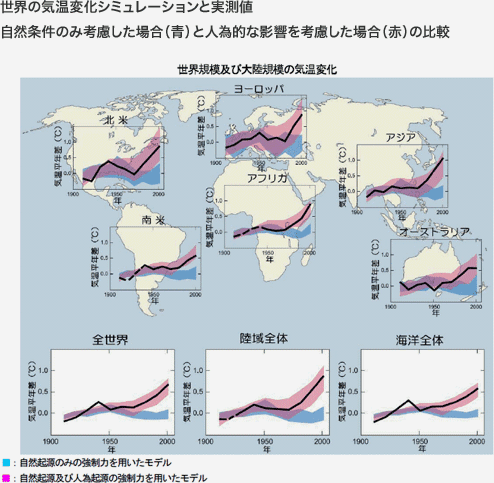
●今後どのくらいさらに温暖化が進むか?
IPCC報告書では、いくつかの温室効果ガス排出のシナリオに対応して、1980年~1999年を基準として、その100年後(2090年~2099年)を予測した結果を記載しています。
気温変化 今後100年間で、1.1~6.4℃上昇
これまで100年間の気温の変化と今後100年間のシナリオ別の気温変化の予想
(ただし、オレンジの線は、今後のシナリオに基づく予想ではなく、2000年現在のCO2濃度が維持された場合のシミュレーション結果)
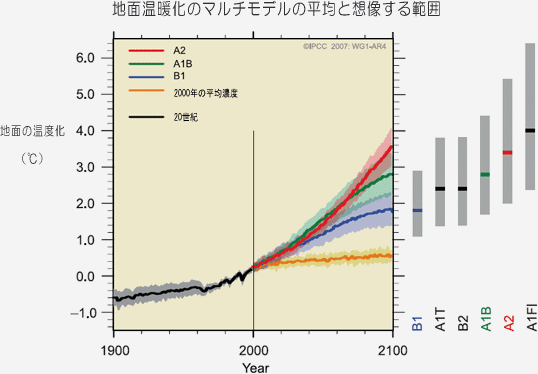
● 温暖化によってどんな変化が起こるか?
IPCC報告書では、次のような変化を挙げています。
- 海面上昇 今後100年間で、18cm~59cmの上昇 ただし、温暖化が千年単位で続くと、グリーンランド氷床の消滅にともない7m程 度の上昇もありうるとしている。
- 高温や熱波の頻度の増加
- 大雨の頻度の増加
- 干ばつの影響を受ける地域の増加
- 強い熱帯性低気圧の活動の増加
- 極端な高潮位の発生の増加
- 水不足、食糧不足、熱波・暴風雨・洪水・干ばつの被害、感染症などのリスクが増大
- 数度の気温の上昇で数十%の種が絶滅のリスクに直面する可能性がある
- 寒冷地(高緯度地域)での水利用可能性の増大や農業の収穫量の増加が見込める
●私の意見
人類の活動によるCO2などの温室効果ガスの増加が、地球の急激な温暖化を引き起こしているのは、ほぼ間違いのないことのよう です。しかし、地球の気候や海面の上昇などのシミュレーション技術は、まだまだ発展の途中であり、決して確立されたものではないし、温暖化がさらに進んだときに、人類にとってどこまで深刻な被害をもたらすのか?もまだまだ不確定な部分も多いようです。 たとえ人間の活動によるCO2が温暖化の原因のかなりを占めるとした場合、今から世界中が協力して対策をとったとしても、その温暖化を食い止めることができるのは、上記の今後100年間の気温変化の今後のシナリオに基づく予想が示すように、100年あるいはそれ以上の時間が必要であり、どちらにしても我々は温暖化した地球と今後100年以上付き合っていかなければならないことが確実です。
ということで、温暖化を食い止める対策ももちろん必要であるが、それ以上に温暖化が起こることは確実であるので、温暖化した場合の対策に力を注ぎ、その被害を最小限にとどめる方により力を注ぐべきではないか?と考えます。
さらに、また緊急度という意味では、温暖化のためのCO2の削減自体よりも「水、食糧、エネルギー資源の不足や高騰」の問題の方を短期的には優先することも必要ではないか?と感じてます。
次回は、これまで挙げてきた3大重要環境問題に対して、現在考えられる対策をまとめておきたいと思います。
2008年12月15日 松井 宏信


